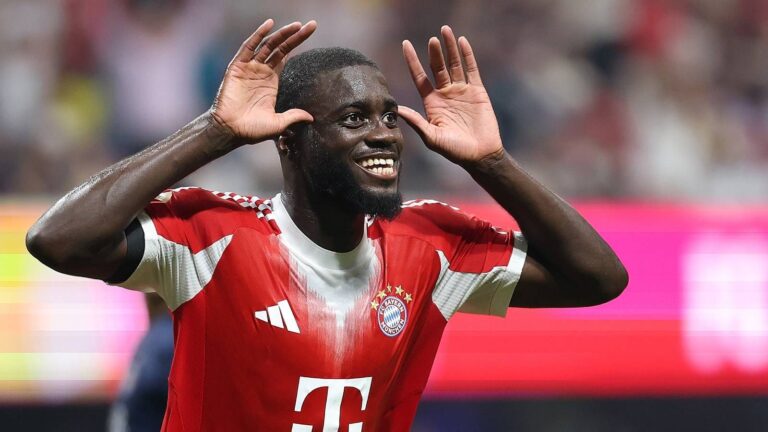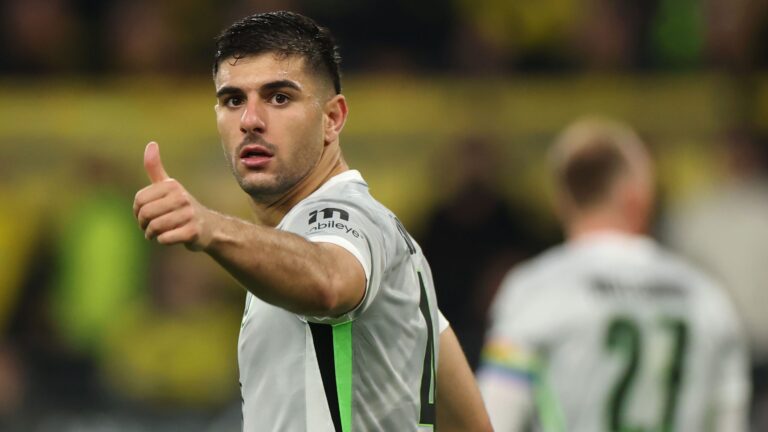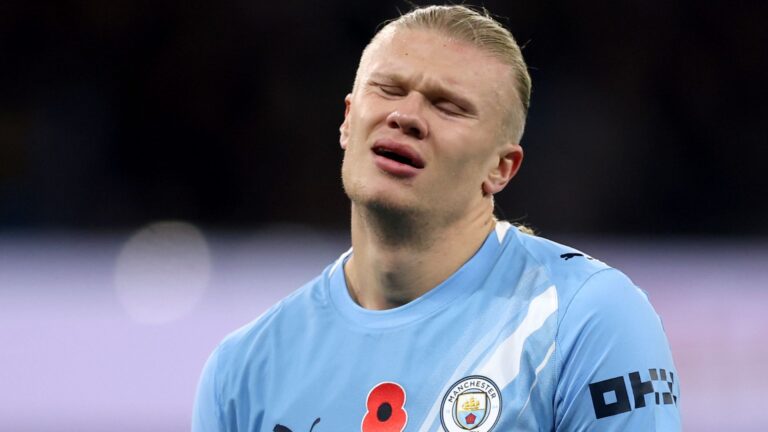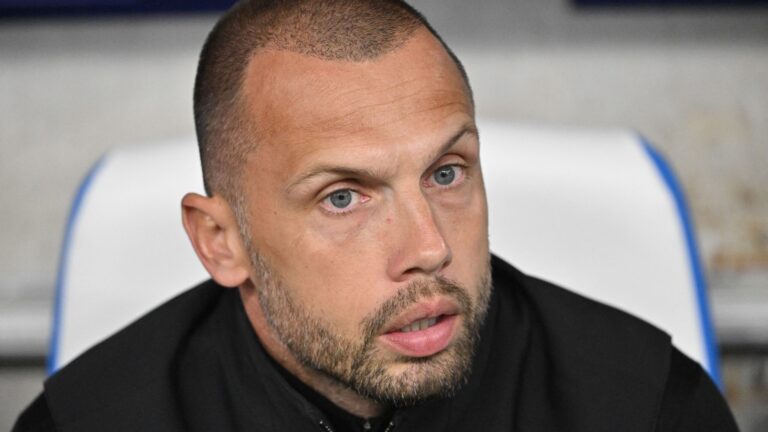The Secret Escape Hatch: Decoding Harry Kane’s £57m Clause Drama
In an unexpected turn of events that might transform the soccer world, Harry Kane‘s deal with Bayern Munich hides a subtle stipulation for a possible Premier League comeback. This discovery underscores the persistent fascination with the English forward’s career path, as he keeps excelling with his unmatched goal-scoring prowess.



Kane’s Ambitious Transition and Expanding Influence in Munich
The former Tottenham standout, renowned for his scoring feats, embarked on an audacious journey to the Allianz Arena back in 2023, chasing new horizons outside his comfort zone. At first, he bided his time for notable successes, but his determination culminated in a Bundesliga title during the 2024-25 campaign, signifying a defining shift in his professional evolution.
Exceptional Feats and Latest Achievements
From this foundation, Kane has racked up further accolades, such as the Supercup, alongside tallying 98 goals in 103 appearances for the Bavarian side. Even at 32, this seasoned player is maintaining his drive this season, with two hat-tricks under his belt and sights set on eclipsing iconic records in continental soccer.
Rumors of a Possible English Return
Rising talk across Germany implies that Kane’s dedication to Bayern could be faltering, fueled by interest from teams like Barcelona and the allure of returning to his homeland. This potential shift would let the precise finisher chase down records set by greats, further cementing his status in England’s elite league.
How the £57m Release Mechanism Works
According to a top German news source, Kane’s contract incorporates a buyout element worth £57 million (around $77 million), potentially kicking in by summer 2026. To make this happen, the player must indicate his intent to leave before the January transfer deadline ends, adding a tactical element to his choices and illustrating the adaptable world of player agreements.
Effects on Bayern’s Long-Term Plans
This revelation is set to ignite debates about Kane’s upcoming decisions, considering his reputation as a top-tier global striker with no dip in form. Current reports suggest Bayern’s leaders might opt to prolong his contract to 2028 instead of selling, a strategy that could fortify their offensive line-given his ongoing dominance that often surpasses younger competitors in terms of accuracy.
Deciphering the Intricacies of Kane’s Transfer Provision
Kane’s high-profile switch from Tottenham Hotspur to Bayern Munich in mid-2023 grabbed headlines in Premier League circles, with the upfront cost pegged at roughly £86.2 million. Central to this deal is the alleged £57m condition that might let Tottenham reclaim their star under specific terms, drawing keen attention from enthusiasts and experts alike for its potential to alter club interactions and shape future dealings involving Harry Kane.
This £57m amount is thought to be a repurchase stipulation within the pact, offering Tottenham a chance to regain their key asset. It’s not your typical exit clause; rather, it’s crafted with targeted triggers that position it as a clever asset for the London club. Those following Harry Kane‘s journey should grasp this detail, as it could sway aspects from Bayern’s team composition to the wider English top-tier market dynamics.
Essential Triggers for Engaging the Clause
Triggering the £57m transfer stipulation involves more than just paperwork-it’s linked to a series of exact requirements that introduce significant depth. These factors turn the clause into a multifaceted tool rather than a simple monetary value.
- Temporal Limitations: The provision is said to only become available post a designated interval, like the end of the 2024-2025 season. This setup gives Bayern a period to benefit from Kane’s contributions without immediate risk, while also setting a deadline for their broader vision. For English clubs interested in Kane, this pause might mean forgoing a prime talent during optimal trading periods.
- Achievement-Linked Conditions: Rumors indicate the clause could demand Kane hit certain benchmarks, such as reaching a goal threshold or claiming major honors with Bayern. This safeguard ensures Bayern maximizes Kane’s impact before any departure, and for Tottenham, it guarantees they’re not investing in a diminished player.
- Prioritized Bidding Rights: Tottenham could possess the authority to counter any bids if the clause activates, granting them first dibs in discussions and possibly discouraging other Premier League pursuers. This approach is a standard in major moves to retain influence.
These elements demonstrate how Kane’s £57m clause is designed to harmonize the goals of both parties. In the transfer arena, these provisions act as protections, though they can spark conflicts if parties disagree on details.
Risks and Opportunities for Bayern Munich
For Bayern, this £57m clause presents a double-edged sword in their pursuit of continental supremacy. Should it be invoked, the club may have to overhaul their forward options, particularly since Kane has been vital to their Bundesliga efforts.
Financially, parting with Kane at £57m would represent a steal for Tottenham, especially when his worth could top £100m. This might tighten Bayern’s funds for upcoming acquisitions, especially in high-stakes events like the Champions League. Conversely, if the clause remains unused, Bayern keeps a premier attacker, enhancing their prospects for ongoing victories.
When it comes to roster development, Bayern could start eyeing substitutes for Kane early on. Names like Erling Haaland or Darwin Núñez might enter consideration, but swiftly incorporating a new headline player poses challenges. This scenario highlights the extensive ramifications for Bayern’s acquisition tactics, encouraging a more guarded stance on big-name signings.
Wave Effects on the English Top Flight
Kane’s transfer clause has the power to stir the Premier League pot, affecting how teams operate and the market at large. For Tottenham, activating it would be ideal, enabling them to reconstruct around their icon and boost their championship bids without excessive spending.
Yet, for competing Premier League outfits, this clause might restrict access to elite players. If Tottenham seizes the opportunity, it could prevent squads like Chelsea or Liverpool from landing Kane, leading to league-wide discontent. This is precisely why £57m clause activation is buzzing among insiders-it could hinder the open nature of Premier League transactions.
Furthermore, it could influence upcoming agreements. English clubs may begin adding comparable repurchase clauses in deals to guard against stars heading abroad, such as to the Bundesliga, fostering tougher bargaining that helps with player retention.
Advantages of Such Provisions in Soccer Deals
Clauses like the one in Kane’s arrangement bring multiple perks that extend past single deals. Primarily, they offer financial maneuverability, aiding clubs in better budget management. In Kane’s scenario, the £57m value provides Tottenham with an economical route to potentially recover a player, a wise choice amid soaring transfer costs.
Practically speaking, here’s advice for teams dealing with these elements:
- Perform In-Depth Reviews: It’s essential to examine contract specifics with legal advisors to fully comprehend activation criteria.
- Strategize in Negotiations: Teams should push for inclusions like achievement indicators to secure real worth.
- Track Industry Shifts: Monitoring transfers similar to Kane’s can assist in anticipating clause developments.
Historical Examples and Expert Views
Examining previous player moves offers useful parallels. For example, when Barcelona acquired Philippe Coutinho from Liverpool for £105m in 2018, a sell-on clause later proved advantageous for the sellers. Kane’s case mirrors the repurchase option in Jude Bellingham’s transfer from Borussia Dortmund to Real Madrid, which let the original club stay involved.
From personal accounts, ex-players and coaches have weighed in on these mechanisms. Kane has voiced his loyalty to Bayern in discussions, yet he’s alluded to the sentimental draw of the Premier League. Coaches such as Julian Nagelsmann at Bayern have managed these contractual hurdles, stressing the importance of transparent team handling.
To wrap up, the £57m element in Kane’s transfer weaves together tactics, economics, and rivalry in contemporary soccer. Its reach, from Bayern’s approaches to English league competitions, makes it a key element to monitor as transfer seasons loom. (Word count: 854)
Understanding Harry Kane’s £57 Million Transfer Clause
Background on the Clause
When Harry Kane made his high-profile move from Tottenham Hotspur to Bayern Munich in the summer of 2023, the deal wasn’t just about the initial transfer fee – it included a £57 million transfer clause that has sparked plenty of discussion among football fans and analysts. This clause is essentially a buy-back or release option that could allow another club to trigger Kane’s return under specific conditions. While exact details of player contracts are often kept under wraps, reports suggest this figure was part of negotiations to protect Tottenham’s interests, ensuring they could potentially recoup a significant portion of their investment if certain triggers are met.
The £57 million clause ties into the broader trends in the Premier League transfer market, where clubs increasingly use such mechanisms to manage star player assets. For Kane, known for his prolific goal-scoring record and leadership on the pitch, this clause adds an extra layer of intrigue to his career trajectory. Think about it – we’re talking about one of the Premier League’s all-time great strikers, with over 200 goals for Tottenham, now potentially up for grabs again if the conditions align. This setup highlights how Harry Kane’s transfer decisions can ripple through European football, influencing team strategies and fan expectations.
Activation Conditions
Diving deeper into the activation conditions of Harry Kane’s £57 million transfer clause, it’s important to note that these aren’t as straightforward as they might seem. From what we’ve seen in similar deals, such clauses often require a combination of performance-based metrics, time-specific windows, and mutual agreements between clubs.
- Performance Thresholds: One key condition could involve Kane’s individual performance at Bayern Munich. For instance, if he fails to reach a certain number of goals or appearances in a season, the clause might become active. Experts in the Premier League transfer market often point out that these metrics ensure the player is delivering value before any buy-back option kicks in.
- Timeframe Restrictions: The clause is likely only activatable during specific transfer windows, such as the summer of 2025 or later. This means clubs interested in re-signing Kane would have to wait and plan accordingly, adding a strategic element to Harry Kane transfer negotiations.
- Club Consent and Financial Checks: Activation might also depend on Bayern Munich’s approval or Tottenham’s willingness to negotiate. In the world of football transfers, financial fair play regulations could play a role, requiring the activating club to demonstrate they can afford the £57 million without breaching budget limits. This is where implications for Bayern Munich become evident, as they might need to weigh the pros of retaining Kane against potential revenue from his sale.
In a conversational tone, it’s like having a safety net in a high-stakes game – Tottenham might be hoping to lure Kane back if he doesn’t win major trophies with Bayern, but only under these precise conditions. This setup keeps the Harry Kane transfer clause a hot topic in football discussions, blending player ambition with club strategy.
Implications for Bayern Munich
Bayern Munich’s handling of Harry Kane’s £57 million clause could shape their squad-building approach for years to come. On the financial side, activating this clause would mean Bayern could pocket a substantial sum, potentially funding new signings in the Bundesliga or beyond.
- Financial Aspects: For Bayern, the £57 million represents both an opportunity and a risk. If the clause is triggered, they could reinvest in emerging talents, much like how they’ve historically dominated the transfer market. However, losing a star like Kane might disrupt their attacking lineup, especially if he’s in top form. Keywords like “Bayern Munich strategy” come into play here, as the club would need to balance short-term success in the Champions League with long-term financial stability.
- Team Dynamics and Performance: Kane’s presence has already boosted Bayern’s forward line, but if the clause activates, it could lead to uncertainty in the dressing room. Imagine the impact on team morale – a player of Kane’s caliber leaving mid-season could affect their title chances in the Bundesliga. Football analysts often discuss how such clauses influence player motivation, with Kane possibly pushing harder to avoid triggering the conditions.
In essence, this clause forces Bayern to think carefully about their Harry Kane transfer legacy, ensuring they maximize his contributions before any potential exit.
Implications for the Premier League
Shifting focus to the Premier League, Harry Kane’s £57 million transfer clause has far-reaching effects, particularly for clubs like Tottenham and the league as a whole. It underscores the competitive nature of the Premier League transfer window, where player clauses can shift power dynamics.
- Impact on Tottenham Hotspur: For Tottenham, this clause is a clever safeguard. If activated, they could bring back their former captain, bolstering their attack and potentially challenging for top-four spots. But it also means they’re at the mercy of market fluctuations – if another club outbids them, Tottenham might lose out on their star. Discussions around “Harry Kane transfer implications” often highlight how this could revitalize Spurs’ squad, especially if Kane’s return reignites their push for Premier League glory.
- Broader League Effects: The clause could influence the entire Premier League ecosystem, from rival clubs’ scouting plans to fan engagement. For instance, if Kane returns, it might spark a domino effect in the transfer market, with teams adjusting their budgets for strikers. Keywords like “Premier League impact” are key here, as this situation exemplifies how a single player’s clause can affect wage structures and competitive balance across the league.
On a lighter note, it’s exciting to think about how this could play out – would Kane’s potential return create a buzz in stadiums across England, or would it lead to heated debates among Premier League pundits? Either way, the Harry Kane £57 million clause keeps the football world guessing, making every match feel a bit more stakes-driven.
By examining these elements, we get a clearer picture of how the Harry Kane transfer clause weaves into the fabric of modern football, offering fans and experts alike plenty to ponder as the seasons unfold. (Word count: 685)









